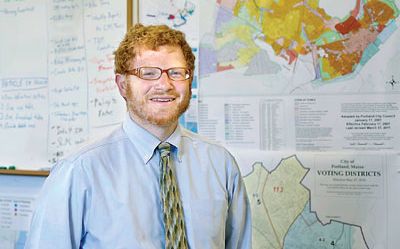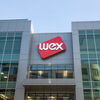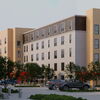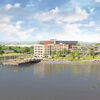How Portland's planning head helped speed up the city's permitting process
 Photo / Tim greenway
Jeff Levine, director of Portland's Planning and Urban Development Department, has been able to shorten the approval process on building permits.
Photo / Tim greenway
Jeff Levine, director of Portland's Planning and Urban Development Department, has been able to shorten the approval process on building permits.
When Jeff Levine took over as director of Portland's Planning and Urban Development Department two years ago, developers were waiting 45 days or more for a commercial building permit, and the process was often a winding path rather than a straight line to the finish.
The former director of planning and community development for Brookline, Mass., was initially tasked with improving Portland's permitting and inspection system.
First, the city opened its records on building permit review times over the last year. The department also set up a new “fast track” permitting system last summer that separates smaller scale projects like home decks from the larger projects, speeding turnaround times for both. It also set up pre-application meetings whereby key parties in the review process, including Levine, meet before a permit is filed to determine what other information is needed or even help a potential filer realize their project might not be feasible.
The result: permit wait times have improved. Between last March and the end of the year Levine said the department was able to reduce building permit review times from 40 days to an average of 30 days.
Levine, who has an energetic yet reasoned demeanor indicative of a long career in city planning, sat down recently in his Portland City Hall office to talk with Mainebiz about improvements to the city's permitting and inspection system, including ongoing efforts to make the entire process electronic. An edited transcript follows.
Mainebiz: You came to Portland when the long permit times were under fire. What did you do to turn that around?
Jeff Levine: One of the mandates I came in with was to work on a permitting and inspection system and to try and make it clearer and faster. We have a precious jewel here with the city of Portland, and we want to make sure any development that happens enhances that livable environment. I think we have reasonably high expectations of developers. If and when somebody meets the goal, which most developers do, we should make it very easy to get a permit.
MB: Any examples of that?
JL: The Hyatt Place Hotel was permitted in 90 days, which to them probably seemed like a long time, but when you do peer-review comparisons, once you factor in the statutory requirements for noticing, that's about as fast as you can get a hotel like that permitted in this city.
MB: How many permits does the city grant each year?
JL: We are seeing about 2,000 building permit applications a year, from decks to a 200-unit hotel. That's a pretty high volume. Applications usually get a permit, so we issue about 2,000 building permits a year.
MB: What most frequently holds up a permit application?
JL: Not getting a complete application in a timely fashion…and we have to go back and forth [with the applicant].
MB: How did the idea come about to meet pre-application?
JL: I was meeting with the City Manager Mark Rees, and one of the ideas he had was, 'Wouldn't it be great if you could have a time when somebody could come in with their idea and meet with all the various stakeholders in City Hall who might have opinions?' We already have Wednesday development review meetings, so I said, 'Let's have an extra time period after that where everyone stays put and we let people come in before they've begun the [permit] process.' People set up a half hour appointment at 12 or 12:30 on Wednesdays. It's an open discussion.
MB: Do you get first-time applicants or repeat developers?
JL: We get all types. There's an online form you fill out [to set up a meeting]. You can have something only drawn on the back of a napkin or a set of plans that you're ready to submit. So it can be, 'I just noticed a for lease sign in this building on Congress Street. What do I need to know before I decide whether I'm interested in it?' Or, 'I've already developed my plans, I want to submit in a few weeks, but I just want to make sure there's nothing missing.'
MB: Who's at the meeting?
JL: Generally we'll have people from planning and zoning, buildings, fire and public services as a core. We'll have the development review services manager, someone who does the zoning review from inspections, usually someone else from inspections who does the building permit review, often one of the city engineers, and then if it's in the historic district, we may have a preservation staff person present. If it's a restaurant we may have someone from public health.
MB: Can you measure the impact of these meetings?
JL: These meetings are by definition outside the normal process, so it's difficult to put numbers on how they've been effective. People clearly see them as valuable because they're willing to wait three or four weeks to have these meetings. We have developers who make it part of their process to have these pre-application meetings. We are tracking our permit review times, but it's hard to say how much of that change is from these meetings.
MB: How many people have you met with so far?
JL: It's been two a week for about 18 months, so about 150. At least half of them end up bringing the project forward. A good 90% of those will actually go into construction. Sometimes we put a whole hour aside for a project we know is big and could have a lot of issues.
MB: Is there a question you get tired of hearing?
JL: We get a lot of questions about fire code. We've tried to educate people about is we have requirements for restaurants based on the Clean Water Act that exceed standard building code standards, for example, for grease traps.
MB: What's the progress toward electronic applications?
JL: We're hoping to get everything electronic by 2016. You can now submit application materials online and check the application status. We're moving toward electronic payments. Now a lot of questions are by email. We'd like a tool to do that in real-time, so we're looking to add a comments field in the permit status. I think being able to apply electronically in your PJs at night is certainly easier than coming in.
MB: How do you stay calm with all the constituencies you have to deal with?
JL: You learn what is and isn't worth getting worked up about. You learn that democracy is part of urban planning in the United States. City-making takes time. I say only half-jokingly that getting anything done takes 10 years. And permitting is always going to be very messy.
Read more










Comments